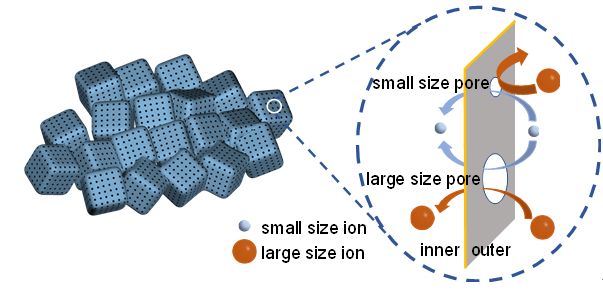| [1] |
Wu J. Chem. Rev. 2022, 122, 10821.
doi: 10.1021/acs.chemrev.2c00097
|
| [2] |
Wang G.; Zhang L.; Zhang J. Chem. Soc. Rev. 2012, 41, 797.
doi: 10.1039/C1CS15060J
|
| [3] |
Zhao J.; Gong J.; Li Y.; Cheng K.; Ye K.; Zhu K.; Yan J.; Cao D.; Wang G. Acta Chim. Sinica 2018, 76, 107. (in Chinese)
doi: 10.6023/A17090422
|
|
(赵婧, 龚俊伟, 李一举, 程魁, 叶克, 朱凯, 闫俊, 曹殿学, 王贵领, 化学学报, 2018, 76, 107.)
|
| [4] |
Shao H.; Wu Y. C.; Lin Z.; Taberna P. L.; Simon P. Chem. Soc. Rev. 2020, 49, 3005.
doi: 10.1039/D0CS00059K
|
| [5] |
Wu Z.; Li L.; Yan J. M.; Zhang X. B. Adv. Sci. 2017, 4, 1600382.
doi: 10.1002/advs.201600382
|
| [6] |
Liu C.; Yan X.; Hu F.; Gao G.; Wu G.; Yang X. Adv. Mater. 2018, 30, 1705713.
doi: 10.1002/adma.v30.17
|
| [7] |
Zhong M.; Zhang M.; Li X. Carbon Energy 2022, 4, 950.
doi: 10.1002/cey2.v4.5
|
| [8] |
Yan J.; Wang Q.; Wei T.; Fan Z. Adv. Energy Mater. 2014, 4, 1300816.
doi: 10.1002/aenm.201300816
|
| [9] |
Das S. K.; Pradhan L.; Jena B. K.; Basu S. Carbon 2023, 201, 49.
doi: 10.1016/j.carbon.2022.09.004
|
| [10] |
You Z.; Zhao L.; Zhao K.; Liao H.; Wen S.; Xiao Y.; Cheng B.; Lei S. Appl. Surf. Sci. 2023, 607, 155080.
doi: 10.1016/j.apsusc.2022.155080
|
| [11] |
Beguin F.; Presser V.; Balducci A.; Frackowiak E. Adv. Mater. 2014, 26, 2219.
doi: 10.1002/adma.v26.14
|
| [12] |
Frackowiak E. Phys. Chem. Chem. Phys. 2007, 9, 1774.
doi: 10.1039/b618139m
|
| [13] |
Li Y.; Li Z.; Shen P. K. Adv. Mater. 2013, 25, 2474.
doi: 10.1002/adma.v25.17
|
| [14] |
Dubey P.; Maheshwari P. H.; Mansi; Shrivastav V.; Sundriyal S. J. Energy Storage 2023, 58, 106441.
doi: 10.1016/j.est.2022.106441
|
| [15] |
Yin J.; Zhang W.; Alhebshi N. A.; Salah N.; Alshareef H. N. Small Methods 2020, 4, 1900853.
doi: 10.1002/smtd.v4.3
|
| [16] |
Zhang R.; Jing X.; Chu Y.; Wang L.; Kang W.; Wei D.; Li H.; Xiong S. J. Mater. Chem. A 2018, 6, 17730.
doi: 10.1039/C8TA06471G
|
| [17] |
Hor A. A.; Hashmi S. A. Electrochim. Acta 2020, 356, 136826.
doi: 10.1016/j.electacta.2020.136826
|
| [18] |
Xie K.; Qin X.; Wang X.; Wang Y.; Tao H.; Wu Q.; Yang L.; Hu Z. Adv. Mater. 2012, 24, 347.
doi: 10.1002/adma.201103872
|
| [19] |
Lyu Z.; Xu D.; Yang L.; Che R.; Feng R.; Zhao J.; Li Y.; Wu Q.; Wang X.; Hu Z. Nano Energy 2015, 12, 657.
doi: 10.1016/j.nanoen.2015.01.033
|
| [20] |
Bu Y.; Sun T.; Cai Y.; Du L.; Zhuo O.; Yang L.; Wu Q.; Wang X.; Hu Z. Adv. Mater. 2017, 29, 1700470.
doi: 10.1002/adma.201700470
|
| [21] |
Zhao J.; Lai H.; Lyu Z.; Jiang Y.; Xie K.; Wang X.; Wu Q.; Yang L.; Jin Z.; Ma Y.; Liu J.; Hu Z. Adv. Mater. 2015, 27, 3541.
doi: 10.1002/adma.v27.23
|
| [22] |
Li G.; Mao K.; Liu M.; Yan M.; Zhao J.; Zeng Y.; Yang L.; Wu Q.; Wang X.; Hu Z. Adv. Mater. 2020, 32, 2004632.
doi: 10.1002/adma.v32.52
|
| [23] |
Fu X. C. College Chemistry, High Education Press, Beijing, 1999, p. 434. (in Chinese)
|
|
(傅献彩, 大学化学, 高等教育出版社, 北京, 1999, p. 434.)
|
| [24] |
Schwertmann U. Plant Soil 1991, 130, 1.
doi: 10.1007/BF00011851
|
| [25] |
Wu Q.; Yang L.; Wang X.; Hu Z. Adv. Mater 2020, 32, 1904177.
|
| [26] |
Tang G.-a.; Mao K.; Zhang J.; Lyu P.; Cheng X.; Wu Q.; Yang L.; Wang X.; Hu Z. Acta Chim. Sinica 2020, 78, 444. (in Chinese)
doi: 10.6023/A20010011
|
|
(汤功奥, 毛鲲, 张静, 吕品, 程雪怡, 吴强, 杨立军, 王喜章, 胡征, 化学学报, 2020, 78, 444.)
|
| [27] |
Wu Q.; Yang L.; Wang X.; Hu Z. Sci. China Chem. 2020, 63, 665.
doi: 10.1007/s11426-020-9748-0
|
| [28] |
Dresselhaus M. S.; Jorio A.; Hofmann M.; Dresselhaus G.; Saito R. Nano Lett. 2010, 10, 751.
doi: 10.1021/nl904286r
|
| [29] |
Ferrari A. C.; Basko D. M. Nat. Nanotechnol. 2013, 8, 235.
doi: 10.1038/nnano.2013.46
|
| [30] |
Jiang Y.; Yang L.; Sun T.; Zhao J.; Lyu Z.; Zhuo O.; Wang X.; Wu Q.; Ma J.; Hu Z. ACS Catal. 2015, 5, 6707.
doi: 10.1021/acscatal.5b01835
|
| [31] |
Maslova O. A.; Ammar M. R.; Guimbretière G.; Rouzaud J. N.; Simon P. Phys. Rev. B 2012, 86, 134205.
doi: 10.1103/PhysRevB.86.134205
|
| [32] |
Yazyev O. V.; Louie S. G. Nat. Mater. 2010, 9, 806.
doi: 10.1038/nmat2830
|
| [33] |
Xu Z.; Tian D.; Sun Z.; Zhang D.; Zhou Y.; Chen W.; Deng H. Colloids Surf., A 2019, 565, 180.
doi: 10.1016/j.colsurfa.2019.01.007
|
 ), 杨立军, 王喜章*(
), 杨立军, 王喜章*( ), 胡征
), 胡征
 ), Lijun Yang, Xizhang Wang(
), Lijun Yang, Xizhang Wang( ), Zheng Hu
), Zheng Hu
